Have you ever wondered how elections and political campaigns work in Japan? What are the differences between Brazil's political campaigns and elections with Japan? In this article, we're going to dig deep and understand a little about Japan's politics and its differences with Brazil.
Japan is a constitutional monarchy with an emperor who serves as its symbol, a head of government (prime minister) and other ministers of state.
Voting in elections in Japan is currently optional (not compulsory) and is limited to Japanese citizens. Unfortunately in Brazil, voting is compulsory, and there's a lot of hassle and expense involved with voter registration and the electoral court, something that doesn't exist in Japan. Now that you know that, let's talk a little about the political situation in each country.
We recommend reading: Japan's Politics - How Does the Government Work?
Table of Content
How do elections work in Japan?
As in Brazil, regional and national elections take place. Regional or provincial elections in Japan are called Chihou Senkyo [地方選挙] while national elections are called Kokusei Senkyo [国政選挙]. Elections usually take place on Sunday from 7:00 am to 8:00 pm.
In Japan they don't use electronic ballot boxes, they prefer to use the traditional voting system to avoid fraud. There are no numbers, voters have to write their candidate's name legibly and place it in the ballot box. Although there are counting machines, votes are usually cast manually in some prefectures, with the results coming in on the day.
As there is no voter registration, Japanese people receive a letter with a receipt, but they can also use their documents if they want to vote but don't have a receipt. Senkyoken [選挙権] refers to the right to vote.
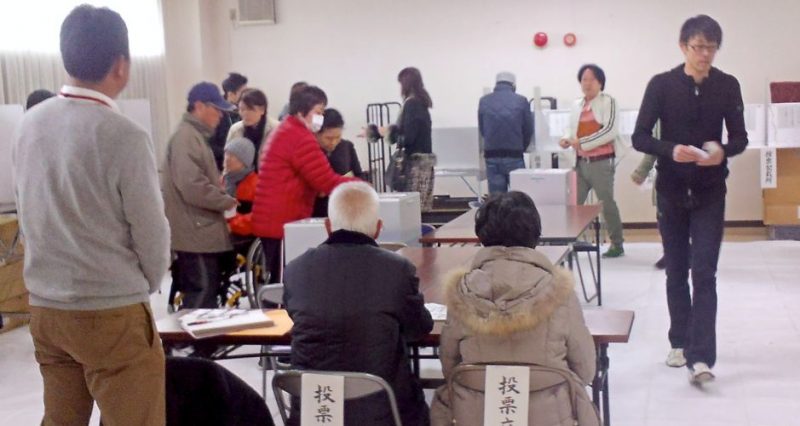
Corruption in Japan is very low and the country is ranked 20th least corrupt country in the world, while Brazil is 96th. During election campaigns in Japan, candidates usually wear a white sash with their name on it and a glove with the name of their party. The glove is white to represent purity, without corruption.
The problem of Japanese elections and political campaigns
Apparently the Japanese don't have many problems in their political circles. There are no free election hours or annoying leaflet distribution like in Brazil. Until a few years ago, the presence of politics on the Internet was very low, since voting is not compulsory and few people waste time trying to get into the heads of others.
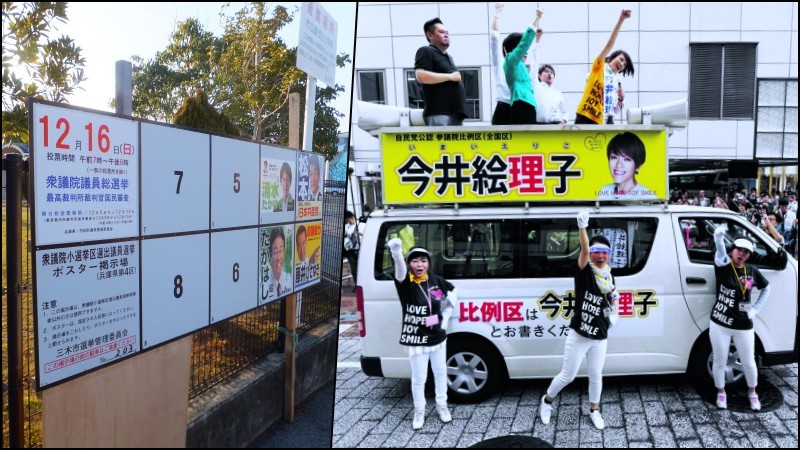
One of the things that can be a nuisance in Japan is the motorcades that candidates take through the city streets speaking into a megaphone. Politicians can also hold rallies, advertise in newspapers or do word of mouth.
Although Japan is a country with a lot of visual pollution, it's not so common to find political posters, but they do exist in some strategic places.
Another negative thing (or not), is that candidates need to pay a glove (advance payment) to the electoral authorities to participate in the election. If they reach more than 10% of the total votes they get their money back, otherwise they lose all their money.

For municipal offices the payment can reach up to 600,000 yen, while in parliament the amounts reach 3,000,000 yen and even 6,000,000. This strategy is used to avoid a huge number of candidates and those famous small parties that exist in Brazil.
Japan's political parties
Japan has several parties, the main ones being the Liberal Democratic Party (PLD) which is currently in power and also the Democratic Party of Japan (PDJ) which was once in power in the 90s. Below we list all the Japanese parties in order of popularity:
- Liberal Democratic Party (LDP);
- Democratic Party of Japan (PDJ);
- Constitutional Democratic Party;
- Party of Hope;
- New Komeito (NPK);
- Communist Party (PCJ);
- Nippon Ishin no Kai;
- Social Democratic Party (PSD);
- Happiness Achievement Party;
- Party of the Smile;
There must be other parties, the last one on the list called the Smile Party is made up of just one member and founder called Mac Akasaka who often appears with extravagant looks. He has appeared in just his underwear or wearing strange outfits like superhero cosplay.
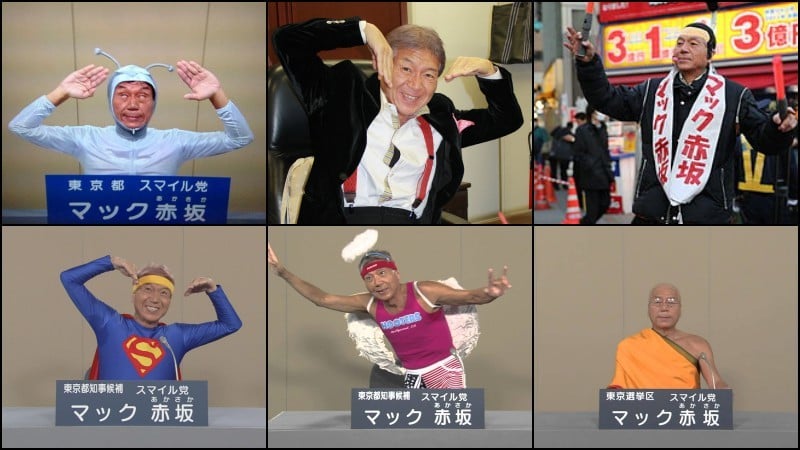
That's right, Japan also has a communist party that manages to maintain a vote average above 5%. One of its objectives is One of the main objectives of the is to end the treaty of mutual military cooperation between Japan and the United States. News circulated on the internet years ago saying that the PCJ is growing, I think it's a big exaggeration.
The problem of Brazilian elections and political campaigns
One of the most absurd things I know is Brazilian politics and elections. For personal reasons I don't even want or can get involved in politics, so I'll try to be 100% neutral, although I confess that my thoughts are a little right-wing. I am currently stunned by issues on social media and TV involving politics.
It seems that all Brazilian political campaigns, both on television and on the Internet, are designed to denigrate and attack another candidate. People choose sides through false, generalized information or just by defending some ideal or principle, ignoring all the nation's other problems.
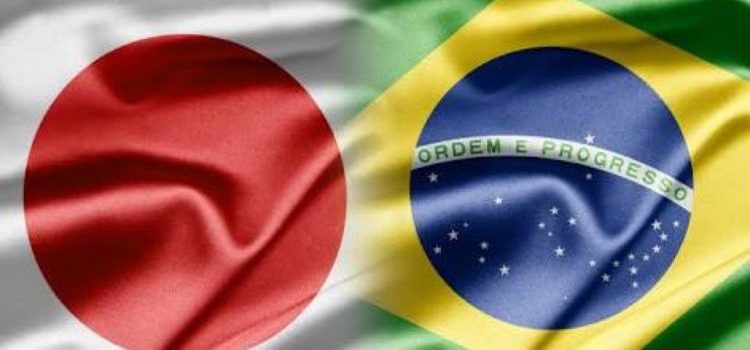
Some people write gigantic texts on social networks wanting to show that they understand politics, but in reality they write every text just to criticize a candidate. The internet today is all about the left destroying the country and a so-called racist candidate who is going to turn Brazil into a military dictatorship. Politics and lies today are practically the same word.
First, that thieves are not limited to just one party or side! It doesn't matter if it's left or right, Brazil will continue sinking if there are no drastic changes in laws and justice as it was done in Singapore and Japan at some point in their history. But who am I to opine? Many seem to be happy with the little that has been done in these decades...
No matter the circumstances, Brazilians still insist on defending bad guys or using the mistakes of others to diminish their candidate's.
Anyway, that's just the basics, we haven't even talked about the political papers and pamphlets that litter the streets at election time and on election day. I don't even need to go into detail about the politics of our country, everyone is already aware.
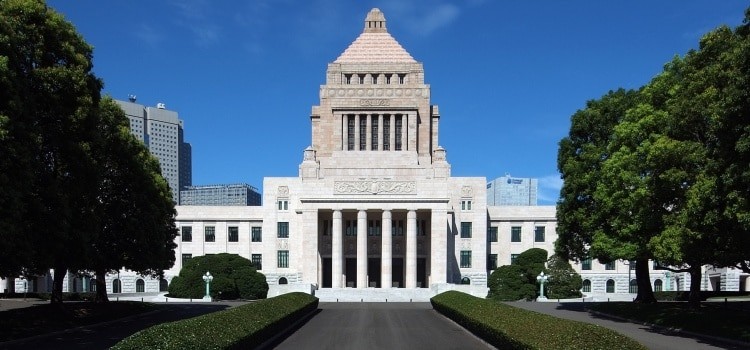
What do we learn from the elections in Japan and Brazil?
Japan's political system is not so different from Brazil or the rest of the world. Fortunately, Japan does not force people to vote, nor does it tolerate messiness or corruption in its country. If an act of corruption occurs and is discovered, the person must apologize publicly and can be imprisoned and lose their position.
We recommend reading: The habit of apologizing in Japanese society
Unfortunately in Brazil politicians steal in our face and still advertise it. I laugh when I see an advertisement on television of a politician talking about the thefts of others, or people on social media trying to defend their candidate from corruption through name-calling or accusations from the enemy side.
Did you know these details about the electoral campaigns and Japanese politics?
